– Cooperation in various areas between the Republic of Uzbekistan and the Republic of Korea has been developing steadily, dynamically and fruitfully since the establishment of diplomatic relations between our countries in 1992. The Joint Declaration on Strategic Partnership was adopted in 2006. There is a most favored nation regime in the field of trade between our countries. The Republic of Korea is Uzbekistan's fourth most important foreign trade partner.
The Intergovernmental Commission on Trade and Economic Cooperation plays an important role in bilateral relations. Since 2018, a format has been introduced for meetings of the Deputy Prime Ministers of the two countries on economic issues. In 2018, an Uzbek-Korean trading house was opened in the city of Incheon, which plays an important role in the supply of Uzbek products to the markets of South Korea.
Uzbekistan and South Korea today support fruitful cooperation in the fields of information technology, digital medicine, education and culture. The experience of South Korea is being widely introduced into the system of preschool education in our country. Korean universities have branches in Tashkent.
There is also a significant similarity in the model of economic reforms - in both countries, the state plays a leading role in economic transformations, great attention is paid to the development of small and medium-sized businesses, the industrial policy of the first stages in the reform process smoothly flows into an export-oriented policy.
Dynamics of recent years
A new page in relations between the Republic of Uzbekistan and the Republic of Korea was opened by the state visit of the President of Uzbekistan Shavkat Mirziyoyev to Seoul on November 22-25, in 2017.
Documents and agreements worth about USD 10 billion were signed, including several large investment contracts with companies such as Hyundai, Evergreen Holdings, Youngone Corporation, Hwachon Plant-Gemco. At the same time, an agreement was reached on technical, advisory and expert support from the Korean specialists of Uzbekistan in the issue of joining the World Trade Organization.
The President of the Republic of Korea, Moon Jae-in, made a state visit to Uzbekistan on April 18, 2019. During this visit, a Joint Declaration on a Special Strategic Partnership was signed between the Republic of Uzbekistan and the Republic of Korea, important agreements were reached and agreements worth more than USD 12 billion were concluded. They cover such industries as energy, oil and gas, chemical, mining, mechanical engineering, electrical engineering, textile and light industries, transport and logistics, infrastructure, ICT, digital medicine. Among them, in particular, the agreement on the transfer of the "Angren" economic zone to the management of the "Incheon" free economic zone deserves attention, in order to launch the production of drugs in demand.
Because of the pandemic situation, the summit of the Presidents of Uzbekistan and South Korea Shavkat Mirziyoyev and Moon Jae In was held in the format of a video conference on January 28, 2021. As a result of the online summit, a Memorandum of Cooperation in the field of "digitalization" was signed in order to promote the "fourth industrial revolution", an Agreement with the South Korean Economic Cooperation Development Fund (EDCF) in the amount of USD 1 billion, digital and green sectors, which are a key element of the Korean New Deal project.
In addition, during this summit, the leaders of the two countries agreed to begin negotiations on concluding a bilateral free trade agreement. The Agreement on Sustainable Trade and Economic Partnership (STEP) will facilitate procedures related to conduction of foreign trade operations and stimulate exports. This agreement could be South Korea's first trade pact under its New Northern Policy, which aims to strengthen economic ties with countries north of the Korean Peninsula.
Moreover, trade and economic cooperation between Uzbekistan and Korea has been expanding especially dynamically in recent years. Foreign trade turnover increased from USD 1,070.4 million in 2016 to USD 2,767.7 million in 2019, slightly decreasing under the influence of the pandemic to USD 2,150.7 million in 2020. Growth in relation to 2016 in 2019 was 258.6%, and in 2020 - 200.9%. If the share of Korea in trade with Uzbekistan in 2016 was 4.4%, then in 2020 it is already 5.9%. The share of Korea's imports in trade with Uzbekistan rose over the same period from 7.2% to 9.9%.
If at the end of 2017 the number of operating enterprises with capital from Korea was 510, then on November 1, 2021, there were already 928 similar enterprises operating in Uzbekistan. In the period from January to October 2021, 80 enterprises with Korean capital were created. In general, the number of operating enterprises with capital of Korea increased by 1.8 times in 2018-2021. The total volume of Korean investments in Uzbekistan has already exceeded USD 7 billion.
Labor migrants are essential for the economy of Uzbekistan and for maintaining a balance of supply and demand in the Korean labor market. South Korea was one of the first countries with which Uzbekistan entered into an agreement on organized labor migration, which has been growing dynamically in recent years.
Prospects for collaboration
Against the background of the current state visit of the President of the Republic of Uzbekistan Shavkat Mirziyoyev to the Republic of Korea, it seems relevant to analyze the prospects for the development of economic cooperation between the Republic of Uzbekistan and the Republic of Korea.
Recently, the Center for Economic Research and Reforms under the Administration of the President of the Republic of Uzbekistan and the Korean Institute for International Economic Policy conducted a joint study, according to which the conclusion of the Agreement on Sustainable Trade and Economic Partnership between Uzbekistan and Korea will increase the GDP of both countries.
In particular, the conclusion of the agreement will lead to an increase in imports of vehicles, components and spare parts, as well as metallurgical products from Korea. This shows that the establishment of a free trade regime and further deepening of economic interaction is beneficial for both Uzbekistan and Korea. There is great potential for deepening economic cooperation in various sectors of the economy and areas of collaboration.
Cooperation between the customs services of Korea and Uzbekistan looks promising in terms of the development and expansion of bilateral trade. In doing so, it aims to improve electronic customs services in Uzbekistan and interaction between the Korean (KONEPS) and Uzbek (dxarid) electronic procurement systems and introduce the latest IT technologies in public procurement. At the same time, the cooperation aims to create an individual information service based on CRM (Customer Relationship Management System).
Reliable and dynamic transport and logistics ties play major role and great importance for the development of trade relations between countries. The joint development of a project with the Korean side to create a modern transport and logistics "hub" in the Tashkent region with the involvement of leading Korean air cargo carriers may be quite important in this direction.
In the perspective of industrial sector, it is promising to create, together with the Korean side, based on the experience of Korea, technopolises specializing in metallurgy, petrochemistry, mechanical engineering in integration with clusters for the production of ferrous metal products.
Considering that metallurgy is one of the leading industries in Korea, the creation of joint metallurgical enterprises in Uzbekistan through the development of iron ore deposits is of great interest.
Since Korea is one of the leading glass producers in South Asia, the creation of joint ventures in Uzbekistan with large Korean manufacturers of building materials, in particular, for the production of this type of product, based on local raw materials, has great prospects.
In the electrical industry, continued cooperation with leading Korean companies (Samsung Electronics, LG) in implementation of the projects for creation of new joint ventures, in particular in production of new generation of household appliances - television, refrigerator, washing machine and air conditioner has significant prospects.
(For example, Samsung Electronics has launched the next generation Neo QLED, Micro LED and Lifestyle TVs, which are rated the best in the world). The study of Korea's experience in supporting investment in innovation and R&D expenditures in the electrical industry can also give a lot for the development of the electrical industry in Uzbekistan.
Deepening cooperation in the chemical industry also has good prospects. In particular, cooperation in this area will increase the export of nitrogen and potash fertilizers from Uzbekistan to Korea in the event of a free trade agreement, as shown by the calculations.
It is very promising to create a joint venture in Uzbekistan for the production of silicone polymer catalysts (raw materials for the production of solar cells) based on advanced Korean technologies.
Due to the fact that Korea pays increased attention to the development of a "green" economy, it would be advisable to participate in the development of a "green" strategy for the production of chemical products in Uzbekistan.
Cooperation between Uzbekistan and the Republic of Korea in the automotive industry has a long history since the establishment in the nineties of the automobile plant UZ - DAEWOO auto in the city of Asaka, which gave rise to the development of the automotive industry in Uzbekistan. Nevertheless, the potential for developing cooperation in this area continues to remain quite high.
Cooperation in the training of personnel in the automotive industry opens up great opportunities, including the training of domestic personnel in Korea as part of the localization of car production in Uzbekistan (Hyundai, KIA), the creation of training centers in Uzbekistan, training and internships for Uzbek specialists in the universities of Korea in the areas of mechanical engineering and engineering.
In the textile industry and the production of clothing, the attraction of Korean fashion brands of clothing of textile companies to the opening of production facilities in Uzbekistan and the expansion and creation of branches of the Uzbek-Korean textile technopark in the regions of Uzbekistan may become promising.
The following figures testify to the profitability of increasing the export of Uzbek fruit and vegetable products to Korea. In 2021, Uzbekistan supplied 206 tons of sweet cherries to Korea (record deliveries in 2017 - 400 tons), while the United States - 12 thousand tons, but on average, for a Korean consumer, sweet cherries from the United States cost twice as much as Uzbek. An increase in the export of Uzbek cherries to Korea will be facilitated by Korean investments and technologies in the creation of intensive orchards for the cultivation of large-caliber sweet cherries in Uzbekistan (including using hydro-cooling technology).
The opening of new branches of the leading scientific and technical institutes of Korea in Uzbekistan will contribute to the deepening of cooperation in the field of science and education, relying on the very positive experience of the Inha and Bucheon universities and the Yeoju technical institute in the city of Tashkent.
Thus, fruitful and mutually beneficial cooperation between Korea and Uzbekistan continues to develop successfully, but there is significant potential for its deepening in the widest range of industries and areas. And you can be sure that this meeting between the President of the Republic of Uzbekistan Shavkat Mirziyoyev and the President of the Republic of Korea, Moon Jae-in will lead to new breakthrough decisions in the field of deepening cooperation in the interests of the peoples of both countries.
Obid Khakimov, Director of the Center for Economic Research and Reforms
magazine "The Korea Post"

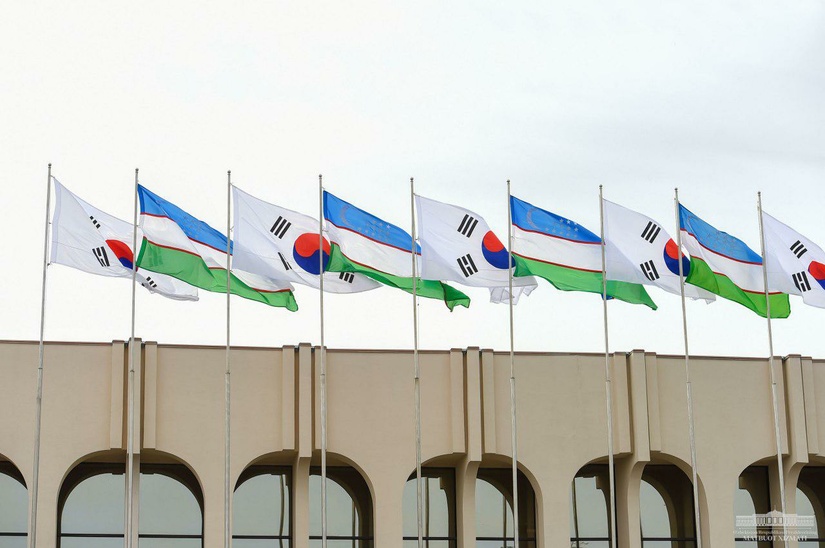
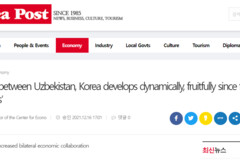
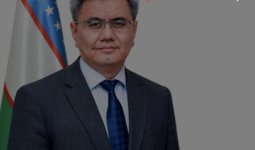
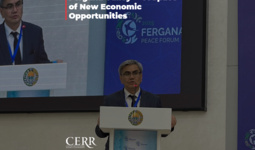
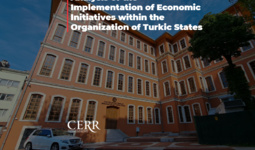
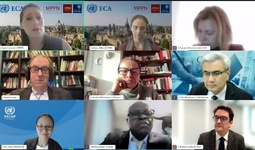
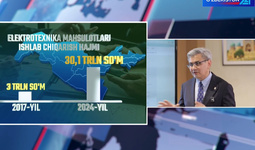
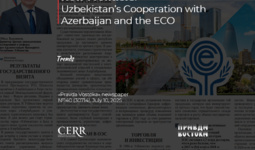













leave a comment